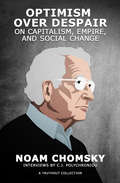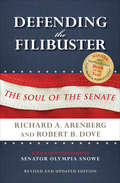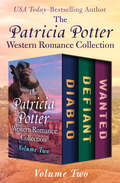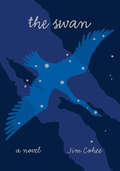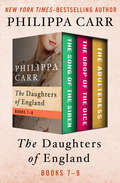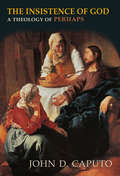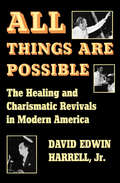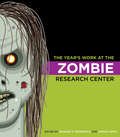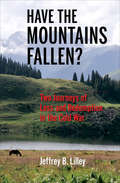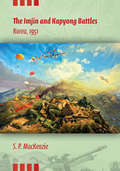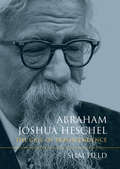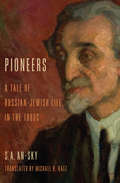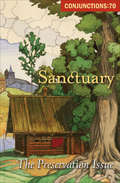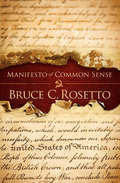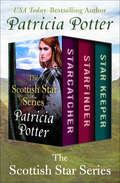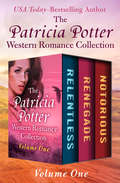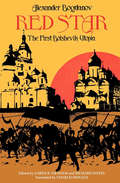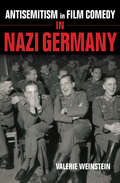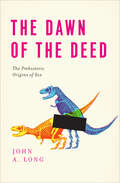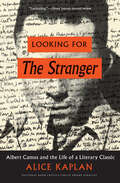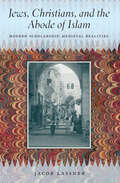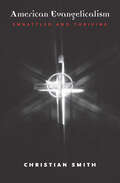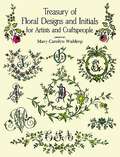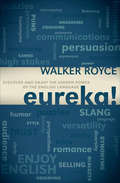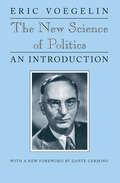- Table View
- List View
Optimism over Despair: On Capitalism, Empire, and Social Change
by Noam Chomsky C. J. Polychroniou&“From meditations on human nature to strategic advice for the Trump era, Chomsky remains the thinker who shaped a generation, a beacon of hope&” (Sarah Jaffe, host of Belabored) This volume offers readers a concise and accessible introduction to the ideas of Noam Chomsky, described by the New York Time as &“arguably the most important intellectual alive.&” In these recent, wide-ranging interviews, conducted for Truthout by C. J. Polychroniou, Chomsky discusses his views on the &“war on terror&” and the rise of neoliberalism, the refugee crisis and cracks in the European Union, prospects for a just peace in Israel/Palestine, the rise of the Black Lives Matter movement, the dysfunctional US electoral system, the grave danger posed to humanity by the climate crisis, and the hopes, prospects, and challenges of building a movement for radical change. &“A must read in these troubling times . . . This is an excellent collection of interviews that highlights Chomsky&’s encyclopedic knowledge of the key issues of our day and his unwavering criticism of the regime of the global 1%.&” —Deepa Kumar, author of Islamophobia and the Politics of Empire &“In this brilliant series of recent and wide-ranging interviews, Noam Chomsky combines an astounding breadth of knowledge, great depth of insight, clarity in explaining his ideas, and a relentless commitment to social and economic justice. The full package is simply exhilarating, especially in our current dismal era of Donald Trump. Optimism over Despair is a book to devour.&” —Robert Pollin, distinguished professor of Economics and codirector of the Political Economy Research Institute &“Especially valuable in helping us navigate the dreadful challenges of the Trumpian era.&” —Michael Klare, defense correspondent for The Nation
Defending the Filibuster: The Soul of the Senate (Encounters: Explorations in Folklore and Ethnomusicology)
by Richard A. Arenberg Robert B. DoveThis award-winning study of today&’s filibuster debate provides a historical overview of Senate rules and an updated analysis of recent controversies.In an age of increasingly divided partisan politics, many argue that the Senate filibuster is undemocratic or even unconstitutional. Recent legislative disputes have brought criticism of Senate rules into sharp relief, and demands for abolition or reform of the filibuster have increased. In Defending the Filibuster, two experts on Senate procedure—a veteran Senate aide and a former Senate Parliamentarian—argue that the filibuster is fundamental to protecting the rights of the minority in American politics. Richard A. Arenberg and Robert B. Dove provide an instructive historical overview of the development of Senate rules, describe related procedures and tactics, and argue passionately for measured reforms.Thoroughly updated, this edition includes a new chapter recounting the events of 2012–13 that led to the first invocation of the "nuclear option" to restrict the use of the filibuster for presidential nominations, as well as a new foreword by former US Senator Olympia Snowe. The authors offer a stimulating assessment of the likelihood of further changes in Senate procedure and make their own proposals for reform.Winner, 2012 ForeWord Reviews Book of the Year, Gold Medal in Political Science
The Patricia Potter Western Romance Collection Volume Two: Diablo, Defiant, and Wanted
by Patricia PotterA trio of historical western romances by an award-winning, USA Today–bestselling author who &“soars above the rest&” (Literary Times). Diablo: Former Confederate Kane O&’Brien is now a spy for the Yanks, sent to infiltrate and destroy a notorious outlaw refuge in Texas. But the mission gets complicated when he meets Nicky Thompson, a desperate beauty who is hiding there. Now she&’s entrusting her life to a sensual stranger whose secret objective may doom them both. &“If you like Jo Goodman, you&’re probably wishing there were more Wild West stories in the same vein. Fortunately for you . . . Patricia Potter wrote Diablo.&” —All About Romance Defiant: A widowed young mother, Mary Jo Williams is new to Colorado territory when she finds herself tending to a wounded outlaw. Wade Foster can&’t ignore the passion between them—or the danger he&’s putting her in. To have a future with Mary Jo, he&’ll have to put his past to rest by taking out the band of killers on his tail. &“Defiant is the next word in great historical romance!&” —Literary Times Wanted: Wrongly accused of murder, Texas ranger Morgan Davis is out to nab the real killer. He didn&’t count on being seduced by the man&’s sister, Lori, a crack-shot temptress who&’ll do anything to save her brother from the gallows. But falling in love with Morgan was the last thing she wanted—and the most dangerous thing that could have happened. &“Patricia Potter is a master storyteller, a powerful weaver of romantic tales.&” —Mary Jo Putney, New York Times–bestselling author
The Swan: A Novel (Break Away Bks.)
by Jim Cohee&“Alternately funny, entertaining, and heartbreaking, The Swan is a fictional memoir about love, death and what a family can―and cannot―endure.&” —Publishers Weekly Indianapolis, 1957. Ten-year-old Aaron Cooper has witnessed the death of his younger sister, Pookie, and the trauma has left him unwilling to speak. Aaron copes with life&’s challenges by disappearing into his own imagination, envisioning being captain of the Kon Tiki, driving his sled in the snowy Klondike, and tiger hunting in India. He is guarded by secret friends like deposed Hungarian Count Blurtz Shemshoian and Blurtz&’s wonder dog, Nipper, who protect him from the Creature from the Black Lagoon—who hides in Aaron&’s closet at night. The tales he constructs for himself, the real life stories he is witness to, and his mother&’s desperate efforts to bring her son back from the brink, all come to a head at an emotional family dinner. &“Funny, poignant and as endearing as its central character, The Swan is a wholly original tribute to childhood resilience.&” —San Jose Mercury News &“Had Kurt Vonnegut, William Saroyan, J. D. Salinger, Carlos Castaneda, Raymond Carver and James Thurber ever gathered at a writer&’s workshop to co-author a short novel, the product might well have been The Swan.&” —Terre Haute Tribune Star &“A surreal study of a grief observed indirectly, The Swan serves as a testament to the unbridled power of childhood vision, even and especially in the wake of tragedy.&” —Bloom magazine
The Daughters of England Books 7–9: The Song of the Siren, The Drop of the Dice, and The Adulteress (The Daughters of England)
by Philippa CarrContinuing the romantic multigenerational saga by a New York Times–bestselling author whose novels have sold over 100 million copies. The Song of the Siren: Carlotta, the love child of Priscilla Eversleigh and Jocelyn Frinton, grows up in the shadow of war during the reign of Queen Anne. When she&’s abducted by the charismatic Jacobite leader Lord Hessenfield, they fall into a passionate affair. After she&’s released, the pregnant Carlotta marries to save her daughter Clarissa&’s legitimacy, but plunges into reckless affairs with other men—including the man beloved by her half sister, Damaris. Even as the half sisters are torn apart by their passion for the same man, they are bound by their love for Clarissa. The Drop of the Dice: Not unlike her mother, Clarissa Field loses her heart to Jacobite rebel, Dickon Frenshaw. But 1715 England is a dangerous place to be a young woman in love. Dickon is caught and exiled to Virginia, and Clarissa is married off to rakish soldier Lance Clavering. Caught between two men, she must navigate scandal, treachery, and betrayal. As civil strife threatens to ignite revolution, Clarissa is accused of being a spy. She faces a terrible choice, and must transform her life to prepare her daughter, Zipporah, for her legacy. The Adulteress: Happily married, Zipporah Ransome journeys from Clavering Court to her family&’s ancestral home in Eversleigh. But at nearby Enderby House, a mysterious place connected to her notorious grandmother Carlotta, Zipporah discovers untapped desires—and the price of their fulfillment. Unable to resist the sensual charms of enigmatic Frenchman Gerard d&’Aubigné, Zipporah is swept up in an affair that leaves her with a haunting secret. Soon her life begins to mirror Carlotta&’s, as scandal, violence, and deception threaten to destroy her home. No one, especially not Zipporah and her daughter, will be left unscathed.
The Insistence of God: A Theology of Perhaps (Indiana Series in the Philosophy of Religion)
by John D. Caputo&“A tour de force . . . provocative ideas expressed in Heideggerian, Derridean, and Deleuzian rhetoric . . . for a new wave of Christian theologians&” (Bibliographia). The Insistence of God presents the provocative idea that God does not exist—God insists. God&’s existence is a human responsibility, which may or may not happen. For John D. Caputo, God&’s existence is haunted by &“perhaps,&” which does not signify indecisiveness but an openness to risk, to the unforeseeable. Perhaps constitutes a theology of what is to come and what we cannot see coming. Responding to current critics of continental philosophy, Caputo explores the materiality of perhaps and the promise of the world. He shows how perhaps can become a new theology of the gaps God opens. &“John D. Caputo is at the top of his game, and he is not content to reiterate what he has already expressed, but continues to develop his own ideas further by way of a thorough engagement with the fields of theology, Continental philosophy, and religious thought.&” —Clayton Crockett, University of Central Arkansas &“For those allergic to theological certainty―whether of God&’s existence or of God&’s death―Caputo delivers storm-fresh relief: the theopoetics of God&’s insistence.&” —Catherine Keller, Drew University &“In my life I have read no more stimulating book of theology. Buckle your seatbelt!&” —Dialog &“An excellent text that opens the way into new forms of theological thinking. He puts forward an argument that must be wrestled with and brings to light new avenues for both religious and theological thought. Caputo is not for the faint of heart.&” —Reviews in Religion and Theology
All Things Are Possible: The Healing and Charismatic Revivals in Modern America (Encounters: Explorations in Folklore and Ethnomusicology)
by David Edwin Harrell Jr.&“The first book to tell the story of the enterprisers who have personal followings . . . a missing link in the chain of American religious movements.&”—Martin E. Marty, author of October 31, 1517: Martin Luther and the Day that Changed the World Written by a Professor Emeritus at Auburn University, this is the first objective history of the great revivals that swept the country after World War II. It tells the story of the victories and defeats of such giants of the revival as William Branham, Oral Roberts, Jack Coe, T. L. Osborn, and A. A. Allen. It also tells of the powerful evangelists who carried on the revival, including Robert Schambach and Morris Cerullo. Those who lived through the great revivals of the 1950s and 1960s will be thrilled to read about those exciting days, and those interested in the religious history of the United States need to read this book to see what has led us up to this present moment in time. &“Harrell has obviously attended countless rallies, read sheafs of literature, and personally interviewed many of the principals. He . . . tell[s] the story in a largely biographical format. This makes for lively reading.&”—The New York Times Book Review &“A book about healing revivalists that takes them seriously and treats them fairly.&”—Journal of Southern History &“Will be a definitive work for some years to come.&”—Reviews in American History &“Will attract readers interested in the reasons behind the various fat and lean periods among revivalists.&”—Publishers Weekly &“Harrell&’s book will doubtless be the definitive work on the subject for a long while—who else will wade through Healing Waters and Miracle Magazine with such fastidious care?&”—Kirkus Reviews
The Year's Work at the Zombie Research Center (The Year's Work: Studies in Fan Culture and Cultural Theory)
by John Gibson Stephen Schneider Jonathan P. Eburne Stephen Shapiro Dan Hassler-Forest Andrea Ruthven Stephen Watt Tatjana Soldat-Jaffe Atia Sattar Seth Morton Erik Bohman Jack Raglin&“Playful and (un)deadly serious . . . chew[s] through a near-exhaustive array of films, television, literature, culture, music and even cocktails.&”—Times Literary Supplement They have stalked the horizons of our culture, wreaked havoc on moribund concepts of dead and not dead, threatened our sense of identity, and endangered our personal safety. Now zombies have emerged from the lurking shadows of society&’s fringes to wander the sacred halls of the academy, feasting on tender minds and hurling rot across our intellectual landscape. It is time to unite in common cause, to shore up defenses, firm up critical and analytical resources, and fortify crumbling lines of inquiry. Responding to this call, Brain Workers from the Zombie Research Center poke and prod the rotting corpus of zombie culture trying to make sense of cult classics and the unstoppable growth of new and even more disturbing work. They exhume &“zombie theory&” and decaying historical documents from America, Europe, and the Caribbean in order to unearth the zombie world and arm readers with the brain tools necessary for everyday survival. Readers will see that zombie culture today &“lives&” in shapes as mutable as a zombie horde—and is often just as violent. &“An intelligent and highly engaging collection that will appeal to legions of zombie fans, to students in the humanities, and to scholars working in fields that have already been affected by or are now preparing for the zombie apocalypse. It blends entertaining, illuminating, and accessible readings of zombies and zombie culture with unique interventions made from authoritative positions of expertise.&”—Julian Murphet, author of Faulkner&’s Media Romance
Have the Mountains Fallen?: Two Journeys of Loss and Redemption in the Cold War (Encounters: Explorations in Folklore and Ethnomusicology)
by Jeffrey B. Lilley&“A thought-provoking book about the long journey of the Kyrgyz people to independence&” that melds the stories of Chingiz Aitmatov and Azamat Altay (Roza Otunbayeva, former president of the Kyrgyz Republic). After surviving the blitzkrieg of World War II and escaping from three Nazi prison camps, Soviet soldier Azamat Altay fled to the West and was charged as a traitor in his homeland of Kyrgyzstan in Soviet Central Asia. Chingiz Aitmatov became a hero of Kyrgyzstan, propelled by family loss to write novels about the everyday lives of his fellow citizens. While both came from small villages in the beautiful mountainous countryside, they found themselves caught on opposite sides of the Cold War struggle between world superpowers. Altay became the voice of democracy on Radio Liberty, broadcasting back into his shuttered homeland, while Aitmatov rose through the ranks of Soviet society, a quiet rebel whose prose masked ugly truths about Soviet communism. Yet just as they seemed to be pulled apart by the divisions of the Cold War, they found their lives intersecting in compelling ways, joined by a common mission to save their people. &“The stories of Chingiz Aitmatov and Azamat Altay are best told together, a herculean task which Jeffrey B. Lilley&’s Have The Mountain's Fallen? Two Journeys of Loss and Redemption in the Cold War manages deftly . . . Their story―because it is, in essence, a single story―is that of Kyrgyzstan itself, replete with tragedy and sacrifice, hope and triumph.&”—The Diplomat &“A Cold War story that gives hope.&”—Richard G. Lugar, United States Senator (Ret.)
The Imjin and Kapyong Battles: Korea, 1951 (Twentieth-Century Battles)
by S.P. MacKenzieAn &“excellent history&” of a massive Communist offensive and the brigades that resisted it (H-War). The sacrifice of the British regiment known as the &“Glorious Glosters&” in defense of the Imjin River line and the hilltop fights of Australian and Canadian battalions in the Kapyong Valley have achieved great renown. Using official and unofficial source material ranging from personal interviews to war diaries, this in-depth study, the first of its kind, seeks to disentangle the mythology surrounding both battles and explain why events unfolded as they did. Based on thorough familiarity with all available sources, many not previously utilized, it sheds new light on fighting &“the forgotten war.&” &“In Korea, on the night of 22nd April 1951, communist forces unleashed what remains, to this day, their greatest offensive since Zhukov&’s storm on Berlin. In the desperate fighting that followed, the key flanks of free world forces were held by one British and one Commonwealth brigade. The former took on a Chinese army; the latter, a Chinese division. Six decades later, an American historian has dismantled the barriers between Australian, British, Canadian, and New Zealand accounts of those whirlwind days to compose the only comparative analysis of the tragedy on the Imjin and the stand at Kapyong.&”—Andrew Salmon, author of Scorched Earth, Black Snow: Britain and Australia in the Korean War, 1950
Abraham Joshua Heschel: The Call of Transcendence
by Shai Held&“Through Heschel, Held&’s work reaches out more broadly to treat us to a profound discussion of the great issues in contemporary Jewish theology&” (Arthur Green, Hebrew College Rabbinical School). Abraham Joshua Heschel (1907–1972) was a prolific scholar, impassioned theologian, and prominent activist who participated in the black civil rights movement and the campaign against the Vietnam War. He has been hailed as a hero, honored as a visionary, and endlessly quoted as a devotional writer. In this sympathetic, yet critical, examination, Shai Held elicits the overarching themes and unity of Heschel&’s incisive and insightful thought. Focusing on the idea of transcendence—or the movement from self-centeredness to God-centeredness—Held puts Heschel into dialogue with contemporary Jewish thinkers, Christian theologians, devotional writers, and philosophers of religion. &“Shai Held&’s book is a master class in one of the most significant Jewish voices of our time.&” —Tablet &“In this lucid and elegant study, one of the keenest minds in Jewish theology in our time probes the vision of one of the most profound spiritual writers of the twentieth century, uncovering a unity that others have missed and shedding light not only on Heschel but also on the characteristically modern habits of mind that impede the knowledge of God. The book is especially valuable for the connections it draws with other philosophers, theologians, and spiritual writers, Jewish and Christian. Enthusiastically recommended!&” —Jon D. Levenson, Harvard University &“[A] thoughtful, illuminating new study of Heschel&’s thought . . . It is one of the many virtues of Shai Held&’s book that it helps us to place Heschel alongside not only Kaplan but Halevi, Horovitz, and Rav Nahman―as well as the Psalmist.&” —Jewish Review of Books
Pioneers: A Tale of Russian-Jewish Life in the 1880s (Jewish Literature and Culture)
by S. A. An-Sky&“A unique work of art&” that captures &“the experiences of an important generation of Russian Jews. . . . and an important document of its time.&” —Gabriella Safran, author of Wandering Soul: The Dybbuk&’s Creator, S. An-Sky S. An-Sky&’s novel dramatizes the dilemmas of Jewish young people in late Tsarist Russia as they strive to throw off their traditional religious upbringing to adopt a secular and modern identity. The action unfolds in the town of M. in the Pale of Settlement, where an engaging cast of characters wrestles with cultural and social issues. Their exploits culminate in helping a young Jewish woman evade an arranged marriage and a young Russian woman leave home so she can pursue her studies at a European university. This startling novel reveals the tensions and triumphs of coming of age in a revolutionary time. &“An-Sky brilliantly captures a week in the life of young Jewish intellectuals fleeing their tiny villages to find the possibility of personal growth in larger towns where the enlightenment has begun to work its way.&” —Jewish Book Council &“Michael R. Katz&’s translation renders another Russian literary gem into fluid and lively English. . . . The publication of Pioneers in English . . . appears at an auspicious moment, for readers today may be more receptive than ever to narratives that convey the richness, complexity, and diversity of Jewish life in times of dynamic and decisive change.&” —Marginalia
Sanctuary: The Preservation Issue (Conjunctions #70)
by Peter Straub Diane Ackerman Howard Norman John Edgar Wideman Rick Moody Joanna Scott Dinaw Mengestu Robert Kelly Karen Russell David Shields Mei-Mei Berssenbrugge Peter Gizzi Brian Evenson Ann Lauterbach Martine Bellen Mary CaponegroExploring the myriad ways in which we go about preserving what might otherwise be forfeited. Whether trained specialists or lay people who care about something, preservationists come from every stratum of life. The archivist, the linguist, the local town historian. The paleontologist, the heirloom seed-saver, the family photographer, the Monuments Men. Old two-by-two Noah and taxonomist Linnaeus. The suburban girl who collects enough yard sale books to build up a library and thereby safeguards that most fragile of things: knowledge. All can be preservationists. This issue includes contributions from Diane Ackerman, Elizabeth Robinson, Peter Gizzi, Kyra Simone, Heather Altfeld, Richard Powers, Arthur Sze, Joanna Ruocco, Andrew Ervin, Julia Elliott, Jessica Reed, Peter Orner, Erin Singer, Daniel Torday, Toby Olson, Mary Jo Bang, Troy Jollimore, Maya Sonenberg, Rae Gouirand, Mauro Javier Cardenas, Nam Le, Maria Lioutaia, Bryon Landry, Rae Armantrout, Robin Hemley, Madeline Kearin, Donald Revell, S. P. Tenhoff, Debra Nystrom, Donna Stonecipher, Robert Karron, Andrew Mossin, J&’Lyn Chapman, Frederic Tuten, and Marshall Klimasewiski.
Manifesto of Common Sense
by Bruce C. RosettoA corporate lawyer&’s manifesto on maintaining America&’s economic superpower status and protecting our country&’s future. Most Americans want the same things. We may differ in our outlook on how to best achieve the things we want for our families, our community, our nation, and ourselves . . . but at our core, the majority of Americans agree with the goals of our nation. Are the glory days of America behind us? It is not too late to change this growing perception, but that change requires the resolve of the American people. We are at war, not only against radical Islam and the forces of terrorism, but, more importantly, we are in an economic war that reflects directly on the ability of the United States to maintain its economic superpower status in the world. If we lose our position as the world&’s leading economic superpower, life in America will change in ways we cannot even begin to imagine.
The Scottish Star Series: Starcatcher, Starfinder, and Star Keeper (The Scottish Star Series)
by Patricia PotterThis trilogy by the USA Today–bestselling author follows a family saga of love and war from 17th-century Scotland to 18th-century colonial America. In the breathtaking Scottish Star series, an award-winning &“master storyteller&” follows three generations of the passionate Sutherland clan. Across oceans and continents, three men face war, rebellion, and unforgettable romance (Mary Jo Putney). Starcatcher: After ten years fighting Cromwell&’s armies, Patrick Sutherland returns home to wed the beautiful Marsali Gunn. But Patrick faces a new battlefront when he finds their families have fallen into a savage clan war. Now Marsali must choose between family loyalty and her star-crossed love. Starfinder: Accused of treason against the British crown, Scottish freedom fighter Ian Sutherland arrives in the colonies as an indentured servant to a Maryland farmer. When the landowner dies, Ian finds a new cause: saving the widow Fancy Marsh from the clutches of her cruel brother-in-law. Star Keeper: Son of a Scottish rebel and an American woman, John Patrick Sutherland raids the cargo of British ships for the patriot cause. A wanted rebel, he finds refuge with Annette Carey. Though loyal to the Tories, Annette gives in to traitorous desire, risking her future for the enemy—a man she must now trust with her life.
The Patricia Potter Western Romance Collection Volume One: Relentless, Renegade, and Notorious
by Patricia PotterThree novels of historical western romance from the USA Today–bestselling &“master storyteller&” (Mary Jo Putney). Relentless: After years of wrongful imprisonment, Maj. Rafe Tyler wants revenge against the Colorado rancher who framed him. The first step is taking the rat&’s daughter hostage. Now, sheltered Boston beauty Shea Randall has a lot to learn about her estranged father&’s devious past—and about forbidden desire. &“After Relentless, Ms. Potter will surely be in a class by herself.&” —Literary Times Renegade: Widow Susannah Fallon came to Richmond to rescue the only family she has left, now held in a Confederate prison. But the stranger sharing her brother&’s cell piques her interest too. As Maj. Rhys Redding helps Susannah escort her wounded brother across the war-ravaged South, they face inescapable dangers—and discover undeniable passion. &“When a historical romance [gets] the Potter treatment, the story line is pure action and excitement.&” —BookBrowse Notorious: The scion of a wealthy Georgia family turned stone-cold gunslinger, Marsh Canton is reinventing himself again. In taking over a San Francisco saloon, he&’s met his match in its Derringer-toting proprietress, Catalina Hilliard. But when they submit to outlaw desire, it changes the stakes of their game. Will it redeem them, or destroy them? &“Smart dialogue and constant action.&” —Publishers Weekly
Red Star: The First Bolshevik Utopia (Soviet History, Politics, Society And Thought Ser.)
by Alexander Bogdanov&“An Earth-man&’s journey to the planet Mars, where he is treated to a wondrous vision of a communist future, complete with flying cars and 3D color movies.&” —Wonders & Marvels A communist society on Mars, the Russian revolution, and class struggle on two planets is the subject of this arresting science fiction novel by Alexander Bogdanov (1873–1928), one of the early organizers and prophets of the Russian Bolshevik party. The red star is Mars, but it is also the dream set to paper of the society that could emerge on earth after the dual victory of the socialist and scientific-technical revolutions. While portraying a harmonious and rational socialist society, Bogdanov sketches out the problems that will face industrialized nations, whether socialist or capitalist. &“[A] surprisingly moving story.&” —The New Yorker &“The contemporary reader will marvel at [Bogdanov&’s] foresight: nuclear fusion and propulsion, atomic weaponry and fallout, computers, blood transfusions, and (almost) unisexuality.&” —Choice &“Bogdanov&’s novels reveal a great deal about their fascinating author, about his time and, ironically, ours, and about the genre of utopia as well as his contribution to it.&” —Slavic Review
Antisemitism in Film Comedy in Nazi Germany (Encounters: Explorations in Folklore and Ethnomusicology)
by Valerie WeinsteinHow party propagandists worked behind the scenes to create unspoken racist messages in the German culture—even in the most lighthearted of movies. Today many Germans look back fondly on 1930s film comedies, viewing them as a part of the Nazi era that was not tainted with antisemitism. Here, Valerie Weinstein scrutinizes these comic productions and demonstrates that film comedy, despite its innocent appearance, was a critical component in the effort to separate &“Jews&” from &“Germans&” physically, economically, and artistically. Weinstein highlights how the German propaganda ministry used directives, pre- and post-production censorship, financial incentives, and influence over film critics and their judgments to replace Jewish &“wit&” with a slower, simpler, and more direct German &“humor&” that affirmed values that the Nazis associated with the Aryan race. Through contextualized analyses of historical documents and individual films, Weinstein reveals how humor, coded hints and traces, absences, and substitutes in Third Reich film comedy helped spectators imagine an abstract &“Jewishness&” and a &“German&” identity and community free from the former. As resurgent populist nationalism and overt racism continue to grow around the world today, Weinstein&’s study helps us rethink racism and prejudice in popular culture and reconceptualize the relationships between film, humor, national identity, and race.
The Dawn of the Deed: The Prehistoric Origins of Sex
by John A. Long&“[A] deliciously written account of the evolution of sex, in all of its bizarre manifestations&” by a noted paleontologist—"Read, blush, and enjoy!&” (Jared Diamond, author of Guns, Germs, and Steel). We all know about the birds and the bees, but what about the ancient placoderm fishes and the dinosaurs? In 2008, paleontologist John A. Long and a team of researchers announced their discovery of a 380-million-year-old placoderm fish fossil, known as &“the mother fish,&” which revealed the earliest known example of internal fertilization. As a result, placoderms are now considered to be the first species to have had intimate sexual reproduction, or sex as we know it—sort of. Inspired by this incredible find, Long began a quest to uncover the evolutionary history of copulation and insemination. In The Dawn of the Deed, he takes readers on a lively tour through the sex lives of ancient fish and the unusual mating habits of arthropods, tortoises, and even a well-endowed Argentine Duck. Long discusses these discoveries alongside what we know about reproductive biology and evolutionary theory, using the fossil record to provide a provocative account of prehistoric sex. The Dawn of the Deed also explores fascinating revelations about animal reproduction, from homosexual penguins to monogamous seahorses to the difficulties of dinosaur romance.
Looking for The Stranger: Albert Camus and the Life of a Literary Classic
by Alice KaplanA New York Times Notable Book. A literary exploration that is &“surely destined to become the quintessential companion to Camus&’s most enduring novel&” (PopMatters). The Stranger is a rite of passage for readers around the world. Since its publication in France in 1942, Camus&’s novel has been translated into sixty languages and sold more than six million copies. It&’s the rare novel that&’s as likely to be found in a teen&’s backpack as in a graduate philosophy seminar. If the twentieth century produced a novel that could be called ubiquitous, The Stranger is it. How did a young man in his twenties who had never written a novel turn out a masterpiece that still grips readers more than seventy years later? With Looking for The Stranger, Alice Kaplan tells that story. In the process, she reveals Camus&’ achievement to have been even more impressive—and more unlikely—than even his most devoted readers knew. &“To this new project, Kaplan brings equally honed skills as a historian, literary critic, and biographer . . . Reading The Stranger is a bracing but somewhat bloodless experience. Ms. Kaplan has hung warm flesh on its steely bones.&” —The New York Times &“For American readers, few French novels are better known, and few scholars are better qualified than Kaplan to reintroduce us to it . . . Kaplan tells this story with great verve and insight, all the while preserving the mystery of its creation and elusiveness of its meaning.&” —Los Angeles Review of Books &“The fascinating story behind Albert Camus&’ coldblooded masterpiece . . . A compelling companion to a novel that has stayed strange.&” —Kirkus Reviews
Jews, Christians, and the Abode of Islam: Modern Scholarship, Medieval Realities
by Jacob Lassner&“One of the greatest authorities on medieval Islam&” sheds &“immensely stimulating&” new light on cross-cultural relations in the Middle Ages (Times Literary Supplement, UK). In Jews, Christians, and the Abode of Islam, historian Jacob Lassner examines the relationship between the three Abrahamic faiths that defined their political and cultural interaction during the Middle Ages—and continues to define them today. Examining the debates taking place in modern Western scholarship on Islam, Lassner sheds new light on the social and political status of medieval Jews and Christians in various Islamic lands from the seventh to the thirteenth century. Using a vast array of primary sources, Lassner balances the rhetoric of literary and legal texts from the Middle Ages with other, newly discovered medieval sources that describe life as it was actually lived among the three faith communities. Lassner demonstrates what medieval Muslims meant when they spoke of tolerance, and how that abstract concept played out at different times and places in the Christian and Jewish communities under Islamic rule. Finally, he considers how this new understanding of medieval Islamic civilization might affect the highly contentious global environment of today.
American Evangelicalism: Embattled and Thriving
by Paul Kennedy Michael Emerson Christian Smith Sally Gallagher David Sikkink&“An excellent study of evangelicalism&” from the award-winning sociologist and author of Souls in Transition and Soul Searching (Library Journal). Evangelicalism is one of the strongest religious traditions in America today; twenty million Americans identify themselves with the evangelical movement. Given the modern pluralistic world we live in, why is evangelicalism so popular? Based on a national telephone survey and more than three hundred personal interviews with evangelicals and other churchgoing Protestants, this study provides a detailed analysis of the commitments, beliefs, concerns, and practices of this thriving group. Examining how evangelicals interact with and attempt to influence secular society, this book argues that traditional, orthodox evangelicalism endures not despite, but precisely because of, the challenges and structures of our modern pluralistic environment. This work also looks beyond evangelicalism to explore more broadly the problems of traditional religious belief and practice in the modern world. With its impressive empirical evidence, innovative theory, and substantive conclusions, American Evangelicalism will provoke lively debate over the state of religious practice in contemporary America. &“Based on a three-year study of American evangelicals, Smith takes the pulse of contemporary evangelicalism and offers substantial evidence of a strong heartbeat . . . Evangelicalism is thriving, says Smith, not by being countercultural or by retreating into isolation but by engaging culture at the same time that it constructs, maintains and markets its subcultural identity. Although Smith depends heavily on sociological theory, he makes his case in an accessible and persuasive style that will appeal to a broad audience.&” —Publishers Weekly
Treasury of Floral Designs and Initials for Artists and Craftspeople (Dover Pictorial Archive)
by Mary Carolyn WaldrepYou'll find a thousand different uses for this practical archive of royalty-free designs with a floral theme. It includes over 700 wonderfully graceful and imaginative designs featuring flowers, leaves, and vines in delicate interlacements. Most incorporate elaborately embellished letters, initials, monograms, and names.Needleworkers, fabric painters, and other craftworkers will love browsing through these pages for the perfect design to personalize towels, handkerchiefs, bed linens, clothing, and more. Textile designers, graphic artists, and calligraphers will also find the volume brimming with useful ideas and models for creating rich floral designs, illustrated letters, borders, and frames.
Eureka!: Discover and Enjoy the Hidden Power of the English Language
by Walker RoyceLearn the ins and outs of effective written and oral communication through a collection of trivia, puzzles, lists, anecdotes, and practical lessons. Eureka! illuminates the oddities, the amusement, and the communication power to be found in the English language. Instead of highlighting all the mechanics and hairball rules of English, Walker Royce leads you through an educational and entertaining workout of your English knowledge and skills. Provocative insights into high-stakes forms of communication—speaking, coaching, selling, interviewing, and even romance—are mixed with English language trivia, humorous anecdotes, and unique puzzles. His inspiring perspective will transform you into a better listener, writer, speaker, and teammate, and it will stimulate some deeper self-observation—a catalyst for improving your own communications proficiency.
The New Science of Politics: An Introduction (Walgreen Foundation Lectures)
by Eric Voegelin&“Must be considered one of the most enlightening essays on the character of European politics that has appeared in half a century… powerful and vivid.&”—Times Literary Supplement &“Thirty-five years ago few could have predicted that The New Science of Politics would be a best-seller by political theory standards. Compressed within the Draconian economy of the six Walgreen lectures is a complete theory of man, society, and history, presented at the most profound and intellectual level…Voegelin&’s [work] stands out in bold relief from much of what has passed under the name of political science in recent decades…The New Science is aptly titled, for Voegelin makes clear at the outset that a &‘return to the specific content&’ of premodern political theory is out of the question…The subtitle of the book, An Introduction, clearly indicates that The New Science of Politics is an invitation to join the search for the recovery of our full humanity.&”—From the new foreword by Dante Germino &“One of the most distinguished interpreters to Americans of the non-liberal streams of European thought…brilliant insights.&”—American Political Science Review
